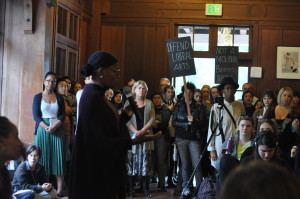On Monday, Oct. 19, President DeCoudreaux sent out a memorandum to students discussing the proposed curriculum changes that administration compiled. One of the proposals that surprised everyone, from students to faculty, is that three programs are to be “taught-out” in the next few years: the undergraduate and graduate Book Art program, the dance undergraduate major, and the American studies major and minor for undergraduate students.
Since then, students in both the book art and dance departments have fought against the cuts in various ways, from petitioning to multiple emails to Tumblr pages of feelings about these occurrences. There have also been forums in the past few weeks to discuss the matter between administration and students, which resulted in more confusion, anger and anxiety among students. At the same time, students and faculty have composed counter proposals in response to the tabled curriculum changes. Recently, students also stood on Holmgren Meadow in protest and solidarity with the departments that are being threatened with the changes before the last forum to address the issues at hand.
First of all, we are just as concerned as every one else is on this campus. As students, we realize the impact of what these proposals could bring to Mills; we take part in these programs that are proposed to be changed and/or cut entirely, so this affects not only the future, but also the present.
Because of that, we hold awareness of the impact that all of these programs have had for the past and present of Mills. For instance, our dance department is the longest continuing program in the country. Mills is known for its book art department, having many of its alumnae go on to successful futures. We have revered and respected professors on our campus in their departments, a mission statement and history revolving around social justice, and so many more things that drew us to Mills during our admission processes and choices. Now that these ideas have been proposed, it makes us wonder not only about our place on this campus, but also the future of Mills.
At the same time, we also acknowledge the potential that the curriculum changes could bring. Based on the memo (aside from the cuts and changes) some of the ideas could be fruitful for Mills. However, the proposed cuts and changes make us wonder about the stakes — financially and historically — for both current and prospective students.
While we do also recognize the historical impact of these respective programs, we also hold awareness on the departmental inequities in them, leading to the campus inequities that the administration holds concern for and have spoken about. Most marginalized students (i.e. students of color, Black students, LGBTQ students, first-generation students, etc.) on campus feel unsafe in classes and on campus, showing an intersectionality between low enrollment/retention rates and the inequities in these departments. In order for both administration and the departments to truly see results, marginalized students have to be included in the conversation that concerns Mills at this point.
Away from our roles as editors, journalists, reporters, photographers, etc., we are still students. We share concerns and values in the proposed curriculum changes. Our roles as participants in the Mills community based on our educational choices cannot make us help but worry about what will happen in the future if these changes are passed.



